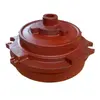Mobile:+86-311-808-126-83
Email:info@ydcastings.com
English
cast iron pump casing
Cast Iron Pump Casing Durability and Efficiency in Fluid Handling
Cast iron pump casings are a cornerstone in many industrial applications, renowned for their strength, durability, and resistance to wear. These casings serve as the protective outer shell for pumps, which are vital components in fluid handling systems across various sectors, including water treatment, agriculture, chemical processing, and oil and gas. The choice of material for pump casings is critical, as it directly influences the pump’s efficiency, longevity, and operational reliability.
One of the primary advantages of cast iron is its excellent mechanical properties. With a high tensile strength, cast iron can withstand significant pressure and stress. This attribute is particularly beneficial in applications involving high flow rates or high-pressure environments. The robustness of cast iron ensures that the pump can operate effectively over extended periods, minimizing the risk of failure under strenuous conditions.
In addition to strength, cast iron exhibits good thermal conductivity, which helps dissipate heat generated during the pumping process. Efficient heat management is essential for maintaining the integrity of the pump and the fluid being handled. Additionally, cast iron has a high resistance to corrosion, especially when treated or coated appropriately. This resistance prolongs the lifespan of the pump casing, reducing maintenance costs and operational downtimes.
cast iron pump casing

Manufacturing processes for cast iron pump casings typically involve casting, forging, and machining. The casting method allows intricate designs and shapes, ensuring that the pump casing can be tailored to meet specific application requirements. Standardization in these processes also means that replacement parts are widely available, which is crucial for industries that require quick repairs and minimal downtime.
Furthermore, the use of cast iron pump casings is environmentally friendly when compared to some alternative materials. Cast iron is recyclable, and its production processes have become more efficient over time, thereby lowering the overall carbon footprint associated with its use. As industries increasingly focus on sustainability, choosing cast iron for pump casings aligns with these environmental goals.
Despite the many advantages, there are considerations when using cast iron pump casings. For instance, the weight of cast iron can be a disadvantage in applications where portability is crucial. Additionally, while cast iron is resistant to corrosion, it is not immune to it. In highly aggressive environments or when subjected to specific chemicals, cast iron might require additional protective coatings to enhance its durability.
In conclusion, cast iron pump casings play a vital role in the performance and reliability of pumps used across a variety of sectors. Their inherent strength, durability, and resistance to wear make them an ideal choice for many fluid-handling applications. Despite some limitations concerning weight and potential corrosion, the overall benefits of cast iron casings, including their recyclability and efficiency in heat management, make them indispensable in modern industry. As technology continues to evolve, innovations in the treatment and manufacturing processes for cast iron will ensure that these pump casings remain a preferred option for years to come.
-
Materials Used in Manufacturing Cap End Pipe FittingsNewsNov.24,2025
-
Material Properties of CF8M CastingNewsNov.24,2025
-
How to Inspect Pump Cap Ends for DamageNewsNov.21,2025
-
Backward Curved Impeller – Efficient Airflow Solutions for Industry | YD CastingsNewsNov.21,2025
-
Automobile Water Pump - Efficient, Quiet, Durable & ElectricNewsNov.21,2025
-
Impeller for Pumps – High-Efficiency, Durable, OEM-ReadyNewsNov.21,2025











